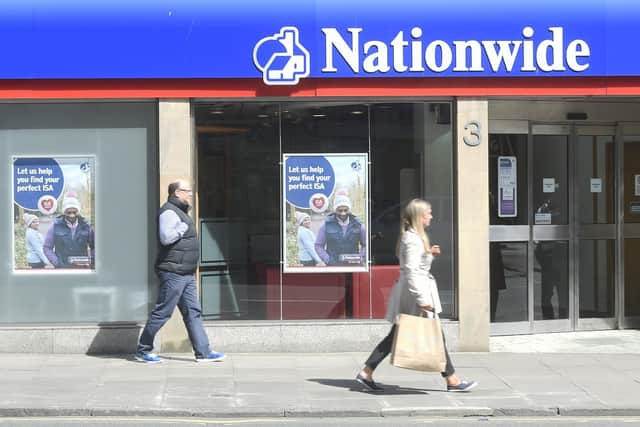Over three million Nationwide customers to get £100 windfall payments after record result
However, the society cautioned over reduced activity in the mortgage market and subdued house prices over the rest of the year. Annual results revealed that underlying pre-tax profit jumped to £2.2 billion in the year to April, from £1.6bn in the previous 12 months. Total underlying income jumped to £4.7bn from £3.9bn the previous year.
The “strong financial performance” has allowed the mutual to launch the Nationwide Fairer Share Payment where eligible members will receive £100 into their current accounts in June. Some 3.4 million members should benefit from the payment, which the building society said was the first of its kind for the group.
Advertisement
Hide AdAdvertisement
Hide AdNationwide, which ranks as the second-biggest mortgage lender in the UK after Bank of Scotland-owner Lloyds Banking Group, said it was about rewarding members “who have the deepest banking relationships with us”, and it is also introducing the Nationwide Fairer Share Bond with competitive interest rates. The bond, which will have a 4.75 per cent two-year fixed rate, is available to all 16 million members.
But Scots-born chief executive Debbie Crosbie said the economic outlook remains uncertain and households could struggle to adjust to higher interest payments. She said the squeeze on household incomes has led to “reduced mortgage market activity and lower house prices which are expected to remain subdued in the second half of 2023”.
She added: “Overall, our borrowers are relatively well placed to withstand challenges in the medium term, given the significant proportion of borrowing on fixed rates, and the relatively low number of borrowers who spend a high proportion of their income on debt repayments. However, the transition to higher interest payments is a challenge for households as they adjust their expenditure priorities. We will continue to support those borrowers who face payment difficulties.”
Samuel Mather-Holgate of advisory firm Mather & Murray Financial said: “Overall, these results seem very positive for a lender that will be thankful of their policy to exclude those most vulnerable to economic shocks.”
Some 275,000 borrowers will see their fixed-rate mortgage deals expire over the next 12 months, Nationwide said, where they could see their monthly payments go up significantly. But such customers saw their affordability stress tested against rates between 6 per cent and 7 per cent when they took out their mortgage, meaning they could be more likely to withstand higher rates. Furthermore, the lender, which rescued the Dunfermline Building Society during the financial crisis, stressed that existing customers fixing to a new mortgage can get access rates of just below 4 per cent.


Director of retail Stephen Noakes said the group was “making sure that the best deals we have are for existing customers”. He added: “We are also continuing to provide strong support for first-time buyers, who are the lifeblood of the industry.”
The proportion of people falling behind on their monthly mortgage payments remains low, but cost-of-living pressures and higher rates means this level is expected to rise in the future, Nationwide added. It resulted in an increase in the group’s impairment charge to £126 million over the past year.
Comments
Want to join the conversation? Please or to comment on this article.